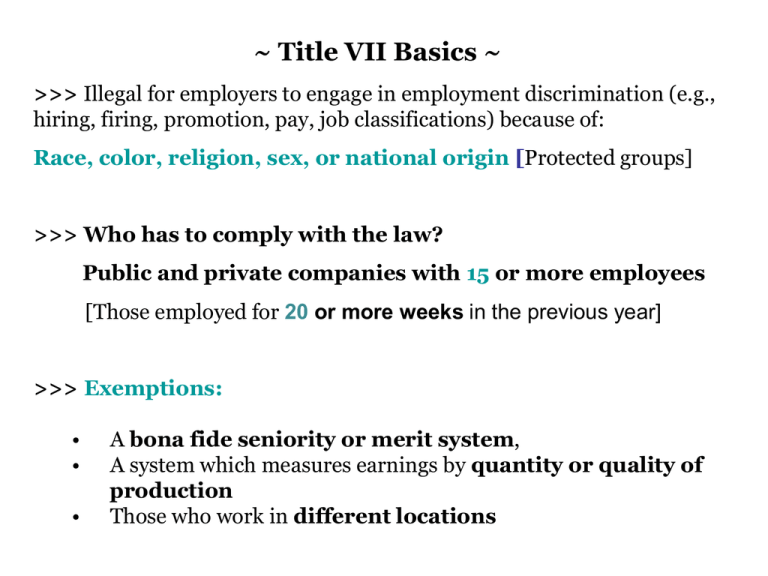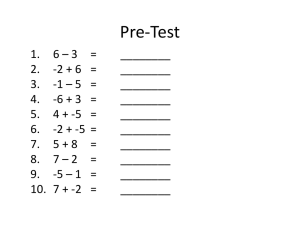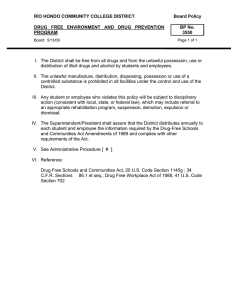
~ Title VII Basics ~
>>> Illegal for employers to engage in employment discrimination (e.g.,
hiring, firing, promotion, pay, job classifications) because of:
Race, color, religion, sex, or national origin [Protected groups]
>>> Who has to comply with the law?
Public and private companies with 15 or more employees
[Those employed for 20 or more weeks in the previous year]
>>> Exemptions:
•
•
•
A bona fide seniority or merit system,
A system which measures earnings by quantity or quality of
production
Those who work in different locations
Basic Protections
UNLAWFUL EMPLOYMENT PRACTICES
SEC. 2000e-2. [Section 703](a)
It shall be an unlawful employment practice for an employer - (1) to fail or refuse to hire or to discharge
any individual, or otherwise to discriminate against any individual with respect to his compensation,
terms, conditions, or privileges of employment, because of such individual's race, color, religion,
sex, or national origin; or (2) to limit, segregate, or classify his employees or applicants for
employment in any waywhich would deprive or tend to deprive any individual of employment
opportunities or otherwise adversely affect his status as an employee, because of such individual's race,
color, religion, sex, or national origin. (b) It shall be an unlawful employment practice for an employment
agency to fail or refuse to refer for employment, or otherwise to discriminate against, any individual
because of his race,color, religion, sex, or national origin, or to classify or refer for employment any
individual on the basis of his race, color, religion, sex, or national origin. (c) It shall be an unlawful
employment practice for a labor organization- (1) to exclude or to expel from its membership, or
otherwise to discriminate against, any individual because of his race, color, religion, sex, or national
origin; (2) to limit, segregate, or classify its membership or applicants for membership, or to classify or
fail or refuse to refer for employment any individual, in any way which would deprive or tend to
deprive any individual of employment opportunities, or would limit such employment opportunities
or otherwise adversely affect his status as an employee or as an applicant for employment, because of
such individual's race, color, religion, sex, or national origin; or (3) to cause or attempt to cause an
employer to discriminate against an individual in violation of this section.
Some Exemptions (Title VII, 1964)
(h) Notwithstanding any other provision of this subchapter, it shall not
be an unlawful employment practice for an employer to apply different
standards of compensation, or different terms, conditions, or privileges
of employment pursuant to a bona fide seniority or merit system, or a
system which measures earnings by quantity or quality of production or to
employees who work in different locations, provided that such differences
are not the result of an intention to discriminate because of race, color,
religion, sex, or national origin, nor shall it be an unlawful employment
practice for an employer to give and to act upon the results of any
professionally developed ability test provided that such test, its
administration or action upon the results is not designed, intended or
used to discriminate because of race, color, religion, sex or national
origin. It shall not be an unlawful employment practice under this
subchapter for any employer to differentiate upon the basis of sex in
determining the amount of the wages or compensation paid or to be paid to
employees of such employer if such differentiation is authorized by the
provisions of section 206(d) of title 29 [section 6(d) of the Fair
Labor Standards Act of 1938, as amended].
~ Bona Fide Occupaional Qualification (BFOQ) ~
(e) Businesses or enterprises with personnel qualified on basis
of religion, sex, or national origin; educational institutions
with personnel of particular religion
(1) it shall not be an unlawful employment practice for an employer to
hire and employ employees, for an employment agency to classify, or
refer for employment any individual, for a labor organization to classify
its membership or to classify or refer for employment any individual, or
for an employer, labor organization, or joint labor-management
committee controlling apprenticeship or other training or retraining
programs to admit or employ any individual in any such program, on
the basis of his religion, sex, or national origin in those certain
instances where religion, sex, or national origin is a bona
fide occupational qualification reasonably necessary to the
normal operation of that particular business or enterprise,
BFOQ (Title VII, 1964)
(e)(2) it shall not be an unlawful employment practice for a school, college,
university, or other educational institution or institution of learning to hire
and employ employees of a particular religion if such school, college,
university, or other educational institution or institution of learning is, in
whole or in substantial part, owned, supported, controlled, or
managed by a particular religion or by a particular religious corporation,
association, or society, or if the curriculum of such school, college, university, or
other educational institution or institution of learning is directed toward the
propagation of a particular religion.


